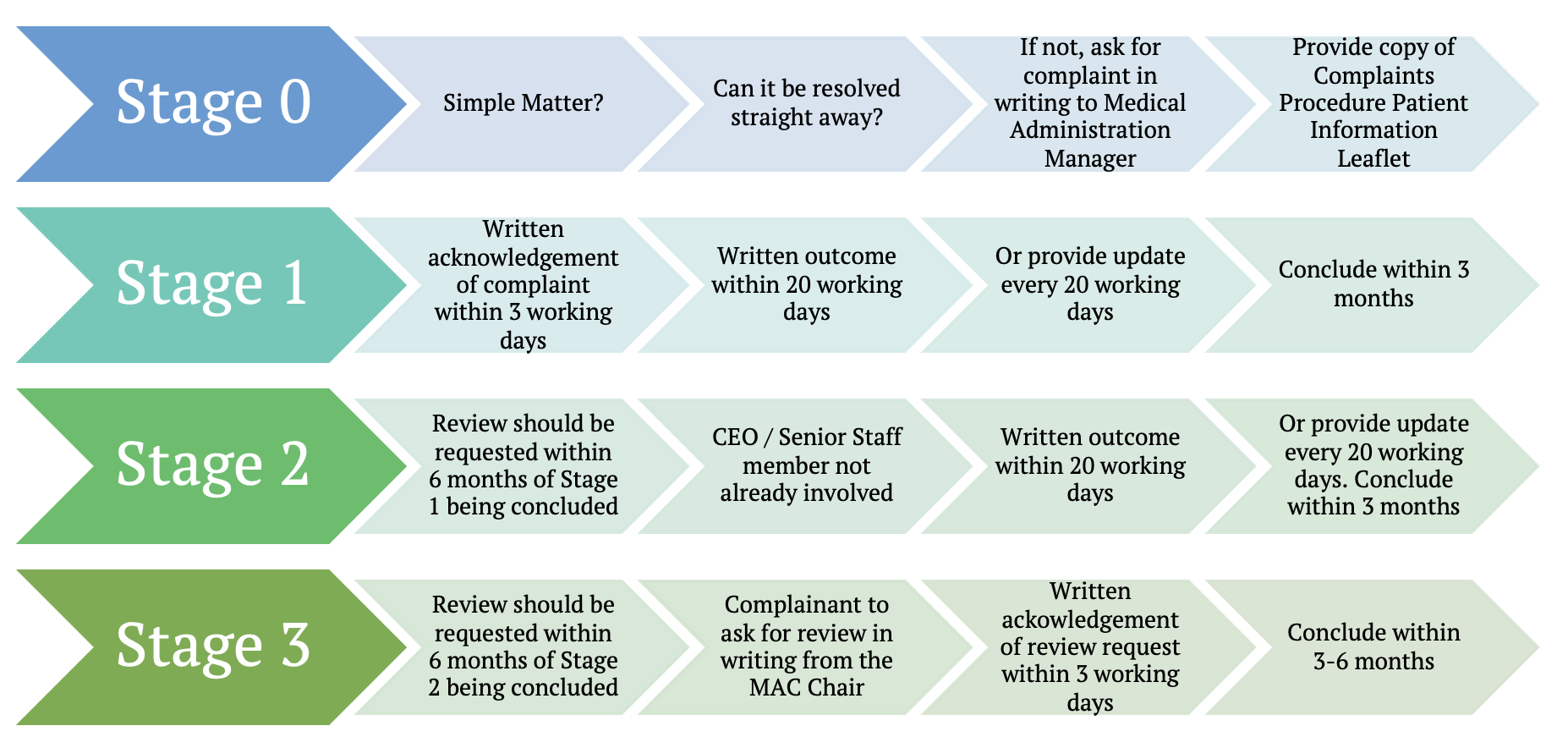ROC strives to provide the highest quality of services possible to all our patients through the delivery of safe, effective and person-centred care. Whenever the care we provide can be improved, we must listen and act. If a concern or complaint does arise, we shall investigate immediately in order to allow for a suitable response. This includes reflection on the problem, and if required, putting improved systems in place to prevent recurrence.
ROC values the views of the users of our services and our complaints procedure helps us build positive relationships with people who use our service in order to rebuild trust when things go wrong. Complaints concerning the service provided are made in line with the complaints procedure and will be handled in accordance with this.
Any feedback is always welcome to be sent to feedback@rochealthselvices.com
Aim
The aim of this document is to ensure ROC patients, customers, and clients are aware of the process for handling complaints.
The aims of complaint management are to ensure that any concerns raised are acknowledged and acted upon, with improvements made to service delivery where appropriate. Formal complaints, expressions of dissatisfaction, comments and concerns can all help raise the quality of the service ROC provides.
It is important that:
- All complaints are taken seriously and responded to appropriately
- ROC learns from any issues highlighted and services are improved (through action plans and systems of governance) as a result
- Formal complaints are investigated and the response to complainants undertaken in a timely fashion
General Principles:
- Anyone who expresses dissatisfaction with ROC services should have easy access to a simple and efficient complaints management process
- Investigations into complaints shall be fair to all concerned, with an emphasis on early communication and effective resolution where possible. This often involves communication with the complainant at the earliest possible stage
- The outcome of investigations should be appropriate and any response or redress proportionate
- Complaints should be viewed as positive opportunities to listen and learn from service users’ views
- Up-to-date information on how to complain must be displayed and readily available to service users
- This Information leaflet must be available to explain the process of making a complaint and how it will be managed
- Fairness and support need to be offered to both complainants and staff
Complaints Procedure
Stage 0
If the complaint is made in person, the member of staff who handles the initial contact will try to establish whether it is a simple matter that can be resolved straight away.
If it cannot be resolved straight away, the individual shall be asked to send the complaint in writing to the Medical Administration Manager and will be provided with a copy of the ROC Complaints Procedure Patient Information Leaflet. A complaint in writing includes email format.
Stage 1
A written acknowledgment of the complaint will be sent to the complainant within 3 working days. The acknowledgement will contain a summary of the complaint and an outline regarding the purpose of the procedure.
The Medical Administration Manager will inform the Management of the department concerned, and Management will begin an investigation of the facts surrounding the complaint.
Management may consult ROC Clinic’s Responsible Officer at any stage for advice on dealing with the matter.
Following Stage 1 of investigation, a written outcome will be sent to the complainant. This should be within 20 working days of the acknowledgement of the complaint, but occasionally this may take longer. If ROC cannot respond within 20 working days, an explanation will be given as to why.
It is expected that Stage 1 will take no longer than 3 months of the complaint being received, unless there is a good reason to explain a longer time frame. If Stage 1 lasts longer than 3 months, an explanation will be given to the complainant as to why this is the case.
Stage 2
If the complainant is dissatisfied with the outcome of Stage 1, they can ask for a review of the complaint. In this case the individual should write to the Medical Administration Manager stating why they feel that their complaint or concerns were not addressed. A request in writing includes email format.
A review of the complaint shall be requested as soon as possible after the individual has received the outcome from Stage 1, this shall be within 6 months. If a review does not alter the outcome, the individual will be informed with the reasons why this is so.
Stage 2 review will be carried out by a member of Management, or CEO, who has not been involved in handling the complaint up to that point.
During Stage 2, Management are expected to review the documentation relevant to the original complaint and may include interviews with relevant staff. They may invite the staff who responded in Stage 1 to make a further response, by investigating a specific matter further.
If appropriate, the complainant may request a meeting with the staff members investigating the complaint. This will be arranged by appointment as soon as possible.
Following Stage 2 of the investigation, a written outcome will be sent to the complainant. This should be within 20 working days of the review request, however occasionally this may take longer. If ROC cannot respond within 20 working days, an explanation shall be given as to why.
It is expected that Stage 2 will take no longer than 3 months of the review being requested, unless there is a good reason to explain a longer time frame. If Stage 2 lasts longer than 3 months, an explanation will be given to the complainant as to why this is the case.
Stage 3
If a complainant is not satisfied with the outcome of Stage 2, they may ask for a review from an external adjudicator – Medical Advisory Committee (MAC) Chair. The MAC Chair will acknowledge the request for a review from a complainant within 3 working days and will aim to provide an outcome within 3-6 months. At any stage, a complainant may choose to write directly to the MAC Chair, CQC, HIS or GMC.
Time Scale
The complainants may bring their concerns or complaint to the attention of ROC within six months of the date of occurrence, or within 6 months of them becoming aware / coming to the attention of the concern or complainant.
- Acknowledgement of the complaint shall be within 3 working days
- Stage 1 shall be concluded within 3 months
- If the complainant is dissatisfied with the outcome of Stage 1, a review shall be requested as soon as possible, however this shall be achieved within 6 months
- Stage 2 shall be concluded within 3 months
- Stage 3 may take 3 – 6 months to complete once submitted to the MAC Chair
Third Party Complaints
Any service user can raise a concern or complain. These can be made on behalf of a service user by any individual that they have authorised to complain on their behalf. This might be a relative, carer, advocate, friend, work colleague, manager, or union representative.
The patient representative must have written permission to act on the patients’ behalf. By granting permission to a third party to act on their behalf, the patient therefore waives their right to confidentiality of their own clinical information, by sharing this with the person acting on their behalf. When responding to a complaint delivered via a third party, principles of medical confidentiality still apply. No information can be released about an individual to a third party without their written consent.
Confidentiality
All complaints are dealt with confidentially, only people directly associated with the incident will be involved. All interview records and correspondence will be kept separate from any medical records.
ROC reserves the right to use anonymised records of complaints for training and audit purposes.
Care Quality Commission
- Finsbury Tower,
- 103 – 105 Bunhill Row
- London
- EC1Y 8TG
- T: 03000 616161
- E: enquiries@cqc.org.uk
- www.cqc.org.uk
Healthcare Improvement Scotland
- Independent Healthcare Team
- Gyle Square
- 1 South Gyle Crescent
- Edinburgh
- EH12 9EB
- T: 0131 623 4342
- E: hcis.clinicregulation@nhs.net
